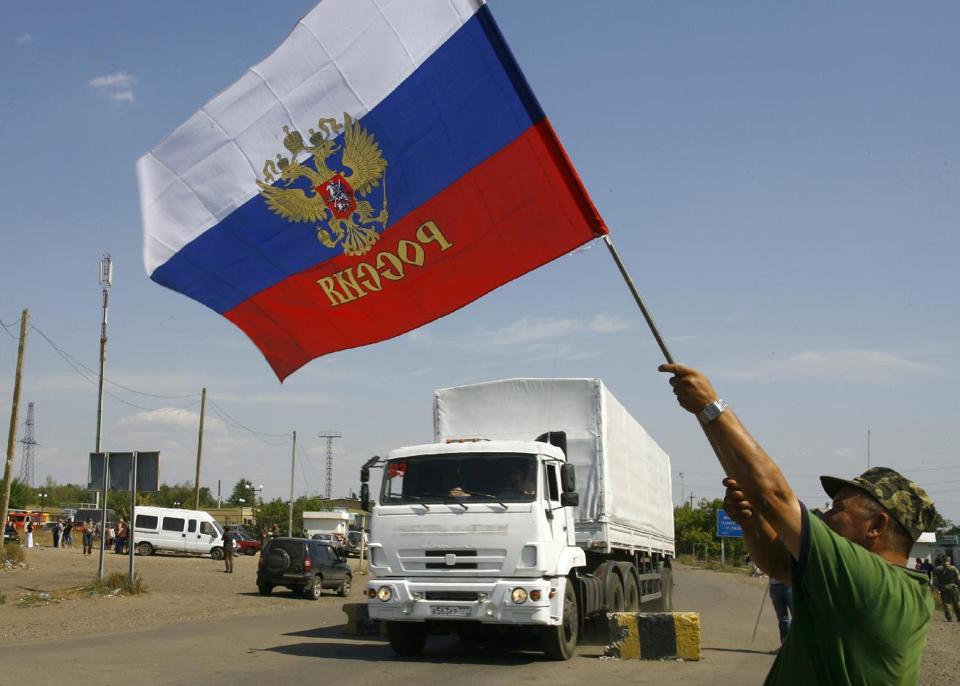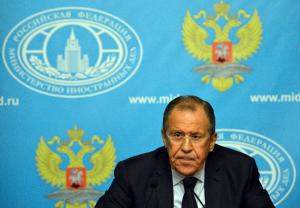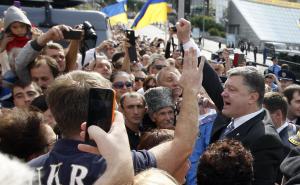
A local resident holds a Russian national flag as part of a Russian ‘humanitarian convoy’ crosses the Ukrainian border at the Izvarino customs control checkpoint, on August 22, 2014 (AFP Photo/Sergey Venyavksy)
Kremlin plans new Ukraine convoy as border clashes rage
AFP
By Nicolas Gaudichet with Max Delany in Kiev and Richard Lein in Moscow
Donetsk (Ukraine) (AFP) – The Kremlin announced plans on Monday for a second aid convoy into Ukraine, heightening tensions on the eve of crunch talks, while fresh clashes raged along the border and around the main rebel-held city.
A Ukrainian military spokesman said troops were battling a contingent of “10 tanks and two armoured personal carriers” flying rebel flags that had crossed a southern part of the border with Russia and was heading towards the government-held city of Mariupol.
Some 120 kilometres (75 miles) to the north, AFP journalists also witnessed heavy fighting raging to the south of Donetsk, the main rebel bastion, a day after separatist leaders said they had deployed tanks and artillery to the area.
Explosions rang out and smoke rose from towns to the south of the city. Ukraine’s military said four soldiers had been killed and 31 wounded in the past 24 hours.
The latest fighting comes as Ukrainian President Petro Poroshenko and Russian leader Vladimir Putin prepare to meet for the first time in months alongside top EU officials in Minsk on Tuesday.
There was additional pressure on the talks after the Kremlin said on Monday that it planned to send another controversial aid convoy into east Ukraine “this week”.
Russia sent 230 lorries carrying what it claimed was 1,800 tonnes humanitarian aid to the rebel-held city of Lugansk without Red Cross monitors on Friday after accusing Kiev of intentionally delaying the mission.
Kiev condemned the move as a “direct invasion” but the trucks returned to Russia on Saturday without incident.
“We would like to agree on the conditions to send the convoy on the same route with the same participation of Ukrainian border guards and customs officers as soon as possible,” Russian Foreign Minister Sergei Lavrov told a news conference in Moscow.
– ‘Enough disinformation’ –
There were conflicting accounts of Monday’s fighting along the border, which if confirmed could represent a new push by rebels in territory controlled by Kiev.
A resident in a nearby town told AFP by telephone that explosions could be heard coming from the direction of the frontier.
But Lavrov dismissed the claims, saying: “I haven’t heard about it, but there has been more than enough disinformation about our invasion. No doubt some foreign newspaper will print that ‘news’ tomorrow.”
Over 2,200 people have died and 400,000 fled their homes after more than four months of fighting that has left residents in some rebel-held cities without water or power for weeks.
Poroshenko has pledged to “talk peace” with Putin when they meet on Tuesday but insists the withdrawal of pro-Kremlin forces is the only way to end the conflict in east Ukraine.
Kiev has accused Russia of ramping up arms supplies to the rebels as government troops have cut deeper into their territory. Moscow has retorted that Ukrainian forces must cease their punishing offensive.
Lavrov played down hopes for a major breakthrough in Minsk, saying only that the talks would “facilitate the exchange of opinions” about “efforts to start the political process to settle the political crisis.”
Both sides are under pressure from the international community to find a compromise.
German Chancellor Angela Merkel called for a bilateral ceasefire and tighter border controls during a visit to Kiev over the weekend while stressing support for Ukraine’s territorial integrity.
She said later in an interview she wanted to find a way out of the crisis “that doesn’t harm Russia” with the EU and US already having slapped the harshest economic sanctions on Moscow since the collapse of Communism.
– Tale of two parades
Passions rose further after rebels on Sunday paraded dozens of captured soldiers past an angry crowd in the centre of Donetsk in an event timed to undermine a military parade taking place in Kiev to mark Ukraine’s Independence Day.
Kiev’s defence minister blasted the rebels and called the parade “a challenge not just to Ukrainian society but to the world.”
Human Rights Watch decried the display as a “a blatant violation of the laws of war” and called on prisoners to be treated with dignity.
But Lavrov stirred further controversy by saying that he “didn’t see anything close to what could be considered as humiliating” in images of the event.

